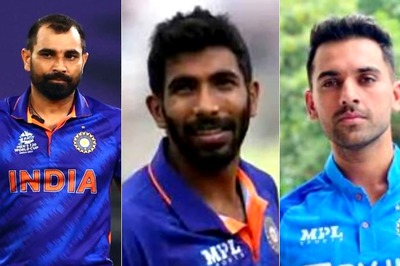
views
Wading into the freebie culture discussion that has heated up in recent times, Telangana chief minister K Chandrashekar Rao on Monday said it was “insulting” to term necessary welfare schemes as free dole-outs.
“From milk for the newborn to construction of a graveyard, the Central government is levying taxes and putting the burden on poor people. People’s welfare is the responsibility of the government and the Central government is not fulfilling it properly and is insulting by calling the welfare schemes freebies,” he noted.
Recently, Prime Minister Narendra Modi said this revadi (luring with sweets) culture was detrimental to India’s development. This was a sharp jibe at the prevalent political approach, particularly of the Aam Aadmi Party in Punjab and ahead of Gujarat polls, of dishing out amenities to the public for free. The opposition, on the other hand, termed it essential and empowering.
News18 looks at how poll promises affect states’ performance:
SORRY STATE
A 2022 research report by the apex bank pinned Punjab as the worst in terms of debt-gross State Domestic product ratio. At present, freebies constitute 17.8% of the state’s revenue.
What’s worse, it is expected to exceed 45% in the next five years. The freebie list also included Andhra Pradesh, with free welfare schemes forming 14.1% of its revenue, and Madhya Pradesh with freebies making 10.8% of its total earnings.
Punjab is already severely debt-stressed, with debt forming more than 50% of its revenue expenditure in 2021-22.
Finance minister Nirmala Sitharaman had also pointed out that the states should carefully consider their budgetary capacities before making freebie promises.
As put formally by the Reserve Bank of India, freebies are essential public welfare schemes that the masses get to avail for free.
DATA CRUNCHING
Nationally, provisions for subsidies, if not complete freebies have widened, following the Covid-19 pandemic. Data from the Comptroller and Auditor General of India corroborates this. Expenditure on subsidies jumped to 11.2% in 2021-22. On an average, states are allocating almost 8.2% of their revenue just to funding subsidies.
However, political analyst and professor of political science at Delhi University, Dr Vijay Verma termed the “change of vocabulary” from welfare schemes to freebies ridiculing. “State intervention is necessary for fundamental areas such as education and basic amenities. To let the private sector take complete control of this space can be troublesome for people of most economic strata”.
As it turns out, promises of free electricity and water go beyond simply being political promises.
PEOPLESPEAK
A survey conducted by the Association for Democratic Reform undertaken in the context of the 2019 elections found that 40% of voters of all 534 constituencies seriously consider the freebies on offer while deciding their vote.
“I don’t see anything wrong with freebies. Most political leaders and parties favour a select few when in power, and their friends and relatives become rich. It’s only right that I get my fair share of this country’s resources in the form of free water, electricity, or more,” a UP-based voter opined.
Read the Latest News and Breaking News here

















Comments
0 comment